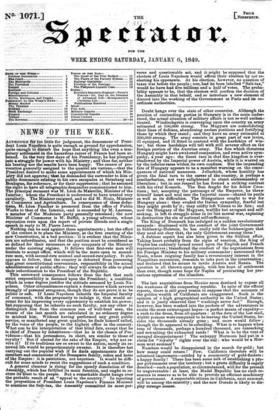NEWS OF THE WEEK.
ALTHOUGH far too little for judgment, the demeanour of Presi- dent Louis Napoleon is quite enough as ground for apprehension, quite enough to disturb the hope that anything like even a tem- porary settlement in the hazardous career of France had been at- tained. In the very first-days of his Presidency, he has plunged into a struggle fbr power with his Ministry; and thus far, neither his bearing nor the results have been happy. The causes of pro- vocation generally assigned to the quarrel are various,—that the President desired to make some appointments of which his Ministry did not approve; that he demanded the surrender to him of
public documents relating to his own escapades at Strasburg and Boulogne, for reference, or for their suppression ; that he assumed the right to have all telegraphic despatches communicated to him. The principal recusant wag M. Leon de Maleville, Minister of the Interior; whom the President is understood to have treated very cavalierly. The Minister resigned, and so did M. Bixio, Minister of Commerce and Agriculture. In consequence of these defec- tions, M. Leon Faucher is promoted from the office of Public Works to that of the Interior, -and is succeeded by M. Lacrosse, a member of the Moderate party generally esteemed; the new Minister of Commerce is M. Buffet, a young advocate, whose reputation rests upon the report of private friends and a single speech in reply to M. Pierre Leroux. Nothing can be said against these appointments ; but the effect of the contest is to place the Ministry, at the first starting of the new Constitution, in a bad position : it is evident that the Minis- ters are subordinates, and that the position must be considered as so defined for their successors or any occupants of the Ministry under the existing regime. It follows that first-rate men will hesitate to accept office, which will be the more open to second- rate men, with second-rate counsel and second-rate policy. It also appears to follow, that the country is debarred from possessing that great constitutional convenience, responsibility in the actual administrators of public affairs: they will always be able to plead their subordination to the President of the Republic. This untoward consequence follows from the fact that such strict responsibility is fastened upon the President; a condition which in some degree justifies the attitude assumed by Louis Na- poleon. Other circumstances explain a demeanour which savours strongly of personal arrogance, though they do not prove it to be politic or safe. If Louis Napoleon inherits the Imperial faculty of command, with the propensity to indulge it, that would ac- count for his improving every opportunity to establish his power; but supposing that he inherits no such faculty, nor any other to distinguish him from the common run of well-bred men, the events of the last month are calculated in no ordinary degree to mislead him. Without having performed any great public service, or manifested any great qualities, he finds himself called, by the voice of the people, to the highest office in the country. What can be his interpretation of that blind fate, except that he is chief of France by inheritance—that he is the chosen of Pro- vidence—that his pretensions, in short, are similar to those of royalty ? But if elected for the sake of the Empire, why not re- vive it? If its traditions are so sweet to the nation, surely its re- newed life would be proportionately sweeter. It is therefore but carrying out the popular wish if he finds appointments for the members and connexions of the Bonaparte family, relics and heirs of the Empire : it is patriotism, not nepotism. It would be diffi- cult for some minds to resist the suggestions of such a condition.
A general clamour is rising for the speedy dissolution of the Assembly, which has fulfilled its main function, and ought to re- stere its trust to the people. But a remarkable doubt hangs over the probable result of an "appeal to the country." In rejecting the proposition of President Louis Napoleon's Finance Minister to continue the Salt-tax, the Assembly committed its most per- verse and questionable act, and it might be supposed that the electors of Louis Napoleon would affirm their election by not re- electing his opponents. At his election, however, no question of taxes was before the people ; nor, had he been labelled " Salt-tax," would he have had five millions and a half of votes. The proba- bility appears to be, that the electors will confirm the decision of the Assembly in that behalf; and so introduce a new element of discord into the working of the Government at Paris and its co- ordinate authorities.






























 Previous page
Previous page